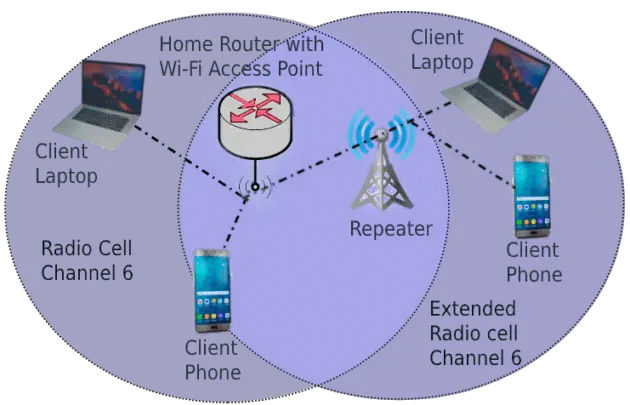Most people use different combinations of wireless and wired technologies for network set up. One should select the networking devices based on the intended usage and the overall area that needs to be covered. The concept of access point vs extender needs to be understood before setting up any network, to avoid pain to the setup in the future.
Some people often get confused between extenders, access points, and repeaters, because they all do a similar job, i.e, to have better network coverage throughout the office, house, and other spaces.
What is an Access Point?
An access point is a device that connects your router, hub, or switches via an Ethernet cable and then broadcasts the WiFi signal using its in-built radio across the area. You can connect all mobile devices like phones, tablets, and laptops to access points.
You can have multiple such access points in the area where you don’t wish to place an extra router. The extra router, if not configured properly, can create a Double NAT issue in the network. To avoid such issues with the network, you will need to know access point vs extender in a better way. People can move around the area like the airport, exhibition halls, and large offices without any drop or change in network connection with the help of wired access points.
What is a Router, and How is it Different from an Access Point?
A router is a networking device that connects devices like smartphones, laptops, desktops, and tablets to the Internet. It allows all the devices connected in the Local Area Network (LAN) to communicate with each other.
Now, you might be thinking of wireless access point vs router, as the wireless router may seem like an access point. So, the main difference is that all the router can work as an access point but all the access points cannot perform functionalities of the router.
The routers have the provision for connecting to the devices using Ethernet cable; access point devices can connect to devices only via WiFi signals. Routers connect to the Internet, while access points can have access to LAN only. An access point cannot route the packets in the network. In simple words, it cannot communicate with the various devices in the network.
These differences make wireless access points different from routers.
What is a WiFi Extender?
WiFi extender expands your WiFi range to the network dead region in your house or office. The WiFi signals are re-broadcasted using a WiFi extender. Hence, you cannot place an extender in a region where there is no WiFi signal. WiFi extender broadcasts on a different WiFi channel than the one used by the router.
There are two types of WiFi extenders:
- One is which connects your router using a wire
- Another one which connects wirelessly
The 1st one is also known as WiFi Network Extender. A WiFi extender cannot regenerate the weak signal. Hence, if your router broadcasts a weak signal then the extender won’t be able to broadcast a strong signal.
What is WiFi Repeater and WiFi Network Extender?
WiFi repeater is similar to the wireless range extender. Both devices are used to extend the range of your WiFi signals. WiFi repeater connects wirelessly to the router and re-broadcasts the WiFi signals creating a new network in the area.
It would be best if you did not place WiFi repeaters where other devices emit radio waves and microwaves. The signals emitted by other devices can degrade the WiFi signals broadcasted by repeaters. Among all these networking devices, the WiFi repeater is the easiest one to configure.
You can use WiFi repeater in the small area of the house where your router doesn’t reach. WiFi repeaters cannot be used in large offices where a strong network is required throughout the area.
As mentioned above, WiFi Network Extender is an extender that connects to the router using cable and wire. WiFi Network Extender does not have bandwidth issues like WiFi repeaters. This is because of a direct-wired connection with the main router.
The main task of the WiFi Network Extender is to broadcast the signals received by the connected router without creating another network area. You can use it to have good WiFi coverage across a strong wall in the office and house.
Let’s see what actually access point vs extender is so that you can set up your network without glitches and issues.
Access Point vs WiFi Extender – How to Select?

As mentioned above, the difference between an access point and an extender is its connection mode to the main router. When it comes to access point vs extender, the Access point uses Ethernet cable, whereas the extender connects wirelessly.
After knowing the main difference, the other difference will let you make a choice of the device in your network set up.
Usage
To select between access point vs extender is not easy as the user’s usage will decide which one to opt for.
The WiFi extender cannot support more devices at a time. Hence, it cannot be used in a large area like airports, exhibition halls, big offices, and malls where the number of connections at a time is very high. WiFi extender does not increase the bandwidth of the network, so increasing the number of devices connected at one time will degrade the quality of the network.
If you wish to increase the range of WiFi networks in a small place like home where one doesn’t require high-speed Internet, then you can opt for WiFi Extender. Well, if you use your home internet for gaming purposes, you need to opt for wired extenders called WiFi Network Extender.
On the other hand, an access point can connect more than 100 devices at a time. So, even if you have multiple people sitting near one access point and connecting to it, the bandwidth of the network won’t fall. You can have multiple access points in your preferred environment, and people can switch smoothly between the different access points without losing their Internet connection.
Feasibility
The amount of space you have will help you decide between access point vs extender. If you don’t have space to place the wires and cables for an access point then you can go with wireless WiFi extenders. Now with an introduction to PoE (Power over Ethernet), the cables and wires required to set up an access point are minimal. PoE carries electrical current via cable instead of power cords. You need to buy a device that can work with PoE for such configuration.
Price
Price plays a vital role when it comes to access point vs extender. The WiFi extender is cheaper than access point devices. You get a 50 percent of performance variation between the two devices. Hence, if you need a normal performing device at a cheap rate, then extenders are for you. Access Point devices are costly and high-performance devices for large environments.
Conclusion
We can set up the network in a better way when we understand the proper functionality of each network component. The above article clarifies most of the main network devices used to extend the range of WiFi signals and also explains access point vs extender in a simple way.
You can select the appropriate device according to usage, feasibility, and price range. The ultimate goal of your network setup should be to achieve a good quality WiFi signal throughout the area covered.
Related: Best Firewall Devices To Provide Ultimate Security To Your Network







